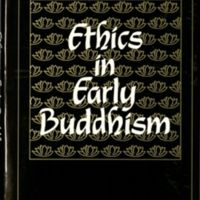Ethics in Early Buddhism
Dublin Core
Title
Ethics in Early Buddhism
Subject
Buddhist ethics
Buddhism -- Doctrines -- History -- Early period, to ca. 250 B.C
Buddhism -- Doctrines -- History -- Early period, to ca. 250 B.C
Description
Throughout the centuries, moral philosophers, both Eastern and Western, considered a permanent and eternal law a necessary requirement for the formulation of a moral principle. If such a law was not empirically given, it had to be determined through reason. In contrast, early Buddhism presented a radical theory of impermanence. Interpreters of early Buddhism have been unable to abandon the presupposition of permanence, however, and hence have persisted in viewing nirvana or freedom as a permanent and eternal state to be contrasted with the impermanent world of sensory experience and bondage. Ethics in Early Buddhism is David J. Kalupahana's balanced and brilliantly concise attempt to place the early Buddhist descriptions of the world of experience, the state of freedom, and the moral principle leading to such freedom within the framework of impermanence.
Creator
David J. Kalupahana
Publisher
Honolulu : University of Hawaiʻi Press
Table Of Contents
1. Pre-Buddhist Indian Moral Theories and Their Ultimate Developments -- 2. Knowledge -- 3. The Fact-Value Distinction -- 4. The World and the Will -- 5. Individual and Society -- 6. The Noble Life (Brahmacariya) -- 7. Virtues: The Beginning of the Way -- 8. The Eightfold Path: The Middle of the Way -- 9. Freedom: The Conclusion of the Way -- 10. The Status of the Moral Principle -- 11. Justification of the Moral Life -- 12. Society and Morals -- 13. Economics and Morals -- 14. Politics and Morals -- 15. Law, Justice, and Morals -- 16. Nature and Morals -- 17. Conclusion: The Stream and the Lotus Pond.
Text Item Type Metadata
Original Format
Book
Citation
David J. Kalupahana, “Ethics in Early Buddhism,” Humanities Hub, accessed February 28, 2026, https://humanitieshub.sdsu.edu/omeka/items/show/1135.


